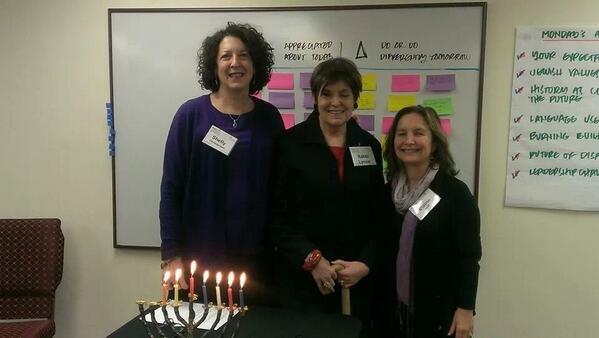
Community Needs
I was fortunate enough to be selected to attend the first Jewish Leadership Institute on Disabilities and Inclusion, held at the Pearlstone Center outside Baltimore, Maryland. The gathering included about 30 professionals and lay leaders from Jewish agencies, and advocates with disabilities from around the country — even one attendee from Toronto!
We spent four intensive days together, learning about providing education and supports for people with disabilities, to help them live and learn in an integrated way into the community. We also discussed the intersection of Jewish values with our work and why Judaism requires the inclusion of people with disabilities in all facets of our lives. Our faculty were leaders in setting policy regarding the inclusion of those with disabilities in the community in general and specifically in the Jewish community. Our faculty also included advocates with disabilities who were able to lend their perspective to what we were learning. Finally, throughout the institute, faculty specializing in leadership guided us through exercises to hone our skills and make us more effective in our work.
Our days were a unique combination of lectures, thought-provoking exercises, delicious kosher meals with produce provided by the on-site farm, and some fun activities designed to help the attendees get to know each other. Our charge now is to go back to our communities, help others learn what we have learned, and look at our agencies to determine innovative ways to increase inclusion in the community.
So, what did we learn? We saw many examples showing that:
1) People with disabilities with the right supports can be included in the community in their housing, their jobs, their schools, and their social activities. We were encouraged to look at each person with disabilities and in turn, encourage them to try to be included in the community in as many ways as possible.
2) Our community needs to act like a community and help people with disabilities and their families to provide these supports. In education, this means including people with disabilities in Jewish day schools and in adult-life, the community needs to help families and the individual plan for when they will live without dependence on their parents.
3) The Jewish community needs to examine how to offer true support to allow people with disabilities to take part in Jewish religious life. Synagogues must think about how they can include their members with disabilities, as well as look outside their membership and encourage people with disabilities – and their families — to come back to the religion in which they were raised.
Following a program like this, I could not help but be inspired by the dedication of the people who attended with me. Our community is fortunate to have such a group of people who are working every day to help those with disabilities be included in our community and have us benefit from their inclusion. For the greatest take-away from this week is what we all have known: people with disabilities have as much to offer our community as we have to offer them. We will all suffer if we prevent ourselves from living fully with these members of our community. The Jewish community should never be seen as turning away those who want to live productive Jewish lives. We all need to work together to allow people with disabilities full inclusion in Judaism and the community in general.
Stacy Jarett Levitan is Executive Director of JCHAI – Judith Creed Homes for Adult Independence — an agency selected for the Slingshot Guide Supplement on Disabilities and Inclusion. JCHAI is in the Philadelphia area, providing supports to enable adults and young adults with intellectual disabilities and autism to live integrated in the community. She can be reached at stacylevitan@jchai.org or 610-667-7875. Follow JCHAI on Twitter or learn more about them on Facebook.
About the author
Stay Included
To stay up to date on our most recent advocacy efforts, events and exciting developments, subscribe to our newsletter and blog!





















